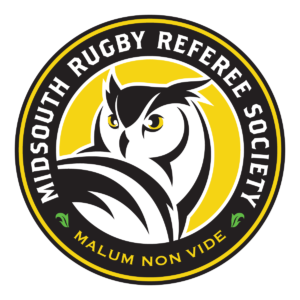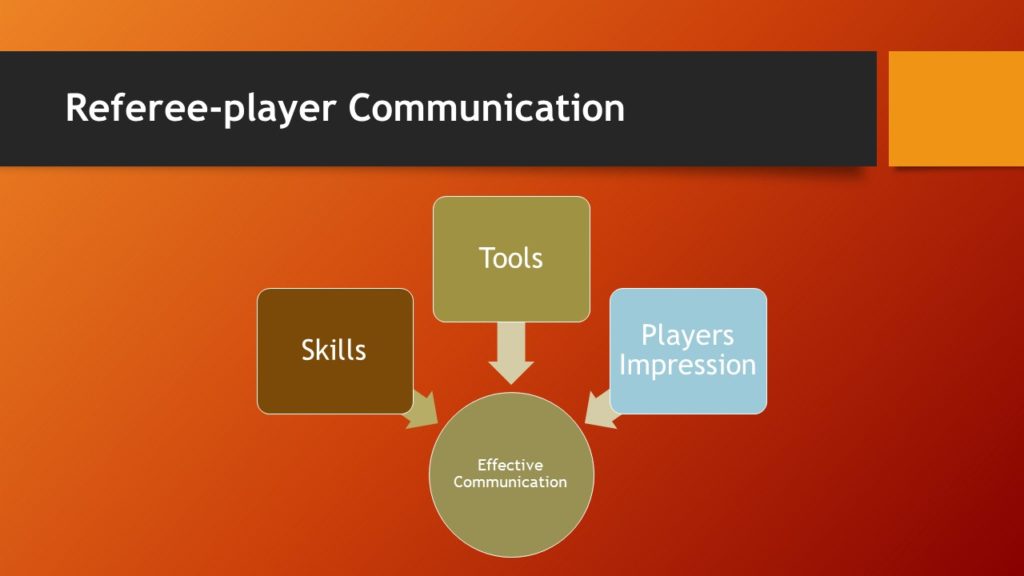Much of referee training centers around knowing the laws, knowing where to be to see the game, and being sufficiently fit to transition along the best positions through the game. Early in one’s referee development, communication is limited to “whistle, signal, talk.” It is the all important aspect of signaling and stating why we blew the whistle. As a referee progresses, they are expected to manage the game, maintain control, and even elevate the game.
Experienced referees demonstrate the skilled communication necessary to achieve these more difficult competencies. There is some interesting research describing communication by elite, international referees. (Elite Refereeing Performance) Yet most training on communication is based on experienced referees/ referee coaches advising junior referees on various communication tools. It is largely assumed that the skills of communication are innate. It is the interpersonal x-factor that some referees have and others do not. Yet, this premise is being questioned by researchers looking at referee-player interactions from a sociological perspective. (Exploring player communication in interactions with sport officials) Perhaps communication skills can be trained, just as law knowledge, game understanding, positioning best practices, mental focus, and physical fitness.

Management, control, and ultimately building a better game requires good decision-making by players and officials. (Communication and Sports Officials) Too much anxiety will inhibit decision-making, and frustration yields anxiety. We need to be aware of sources of referee and player frustration in order to foster an environment for the players to demonstrate skillful play and a great game!
Consider your sources of frustration. Now consider the players’ perspective and their sources of frustration.
Effective referee communication involves referee communication tools, communication skills, and the players’ impression of the referee. Let’s look at these 3 areas and their underlying components.

Any good tool of communication will allow the referee to engage the offenders attention, project confidence in the decision, and promote a perception of fairness. Examples of researched communication tools are:
- Avoiding unnecessary words and actions
- Explanation of less than six words
- Calmness appears more fair than anger
- Having an explanation is perceived as more correct than decision without explanation
Tools are important, but elite rugby referees read the nuance of the situation. Communicators with complex perceptions of social situations process a more nuanced, person-centered communication. It is effective, because it is tailored for the audience. It requires empathy and an ability to sense what the audience is feeling. These skills can be developed. One way is to study rugby games. Don’t test yourself on making the right decision but rather test yourself on explaining the correct decision. Referees and educators will commonly focus on making the right call, but practice explaining the right call will build a deep bank of memories from which to pull during a game situation. A prevailing theory of what makes one a good communicator is that, when presented with a situation, one scans their memory for a similar communication goal, reviews different options, and accommodates for the novel situation.(Strategic Interaction in Player-sport Official Encounters)

Lastly, consider the players’ impression. Players are most likely to positively receive communication if it is considered fair. Surveys of hundreds of players reveal that fairness is determined by the referee being competent, dependable, and respectful. This trifecta exists well before the game starts and is an important part of every referee’s qualities in order to build beneficial impressions with players and coaches.
Through developing the skill of sensing with empathy, using the tools of planning and recalculating the messages through the game, couched with personal characteristics that project competency, dependability and respect, referees can foster efficient communication that builds a better game.

